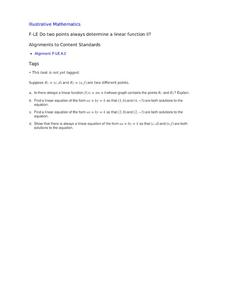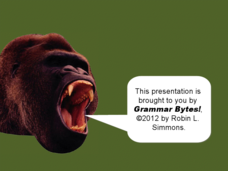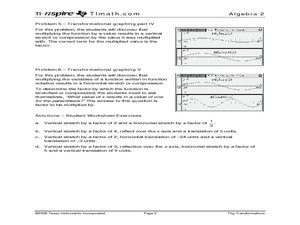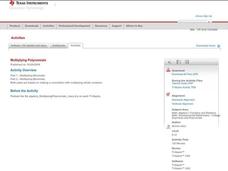EngageNY
Getting a Handle on New Transformations 2
Use 2x2 matrices to move along a line. The second day of a two-day instructional activity is the 28th installment in a 32-part unit. Pupils work together to create and solve systems of equations that will map a transformation...
Curated OER
Simple Linear Equations (B)
Learners solve 18 equations by isolating the variable using the inverse operation. They determine the value of each variable.
Curated OER
Simple Linear Equations (D)
Super simple equations are yours for the solving. This worksheet includes 15 simple linear equations for learners to solve and an answer sheet.
Shmoop
Box, Stem-Leaf, and Histogram
A helpful and versatile worksheet requires young mathematicians to analyze data in order to create graphs and answer questions. Additionally, it prompts learners to find the mean, median, mode, and range of some of the data sets.
West Contra Costa Unified School District
Quadratic Equations — What We Know
Everything you could possibly want to know about quadratic equations, all in one resource. Instructors demonstrate how to translate between different forms of quadratics (equation, table of values, graph, verbal description) and finding...
West Contra Costa Unified School District
Fractional Exponents and Property of Exponents
Don't just use a fraction of this resource ... use it all. Learners first investigate patterns to determine how to deal with fractional exponents. Individuals then evaluate expressions involving fractional exponents.
West Contra Costa Unified School District
Shifting Linear Equations in Function Notation
Time for a shift in thinking! Learners examine translations of linear functions. They use function notation to describe the translation and make connections to the graph.
EngageNY
From Ratio Tables to Equations Using the Value of a Ratio
Use the value of a ratio to set up equations. The teacher leads a discussion on determining equations from ratio tables in the 13th portion of a 29-part series. Pupils determine which of two equations to use to find the solution....
West Contra Costa Unified School District
Mixture Problems
Mix up your lessons with the resource on mixture problems. Scholars use manipulatives to model and solve mixture problems. Individuals then set up both one- and two-variable equations to solve the problems.
Curated OER
Birthday Problem
Young scholars identify the probability of an event occurring. Learners explore the complement of an event in finding why an event will not happen. They also explore basics of probability within algebra.
Illustrative Mathematics
Writing Expressions
Practice writing algebraic expressions from written phrases. The objective is to consider two seemingly similar phrases, write them as algebraic expressions, and then simplify using the order of operations. Learners are challenged to...
Curated OER
Do Two Points Always Determine a Linear Function II?
Learners analyze the difference between the slope intercept and standard forms of a line in this task. Given two general points using letters they explore linear functions and linear equations.
Lone Star College
Geometry Worksheet II
Young geometers get practice with the algebra of angles in an extensive skills practice worksheet. Supplementary, complementary, and vertical angle relationships are used, along with parallel lines cut by a transversal and angle sum...
Curated OER
Pronoun Reference
For high school students, this presentation defining the correct use of pronouns, might be invaluable. Many students have trouble knowing when to use them in a sentence. By engaging in this presentation, learners can start to explore the...
Curated OER
Solar Kit Lesson # 12 - Calibration Curve for a Radiation Meter
Scientists need to have mastered algebraic slope-intercept concepts in order for this lesson to be effective. They will measure and graph solar panel output as a function of the amount of radiation striking it, discovering that there is...
Curated OER
Trig Transformations
Learners investigate trigonometric function. In this Algebra II lesson, high schoolers explore functional notation and transformational graphing of trigonometric functions.
Curated OER
Murder in the First Degree - The Death of Mr. Spud
Secondary learners investigate exponential functions in a real-world scenario. They collect data on the temperature of a cooling baked potato, enter the data into lists, and graph the data using a scatter plot before finding an...
Curated OER
Multiplying Polynomials
Investigate polynomial multiplication with the TI-nspire handheld calculator. Using the applications on this calculator, learners explore multiplication of numbers, binomials, a binomial by a polynomial, and polynomials. The dynamic...
Curated OER
Sums and Difference of Cubes
Learners factor polynomials using the sum and difference of cubes. They also learn connections between the graph and expression.
Curated OER
How to Implement Project Based Learning to Engage Students
Can a math teacher employ project-based learning? Learn how one great math teacher uses PBL to design math projects that provide learners with a more challenging and holistic learning experience. A wonderful article, that includes...
National Security Agency
Growing Patterns: Practical Pattern Problems
Your learners explore growing patterns by describing, extending, creating, and evaluating practical pattern problems in this three-day collaborative unit. Beginning with concrete patterns and function tables to extend and...
Curated OER
Supernova Chemistry
Using spectroscopes, high school astronomy, physics, or chemistry learners observe emission spectra from several different sources. This stellar NASA-produced lesson plan provides terrific teacher's notes and a student handout. Make sure...
Curated OER
It's Not All Greek to Me
Learners find out the meaning for prefixes used in math vocabulary. By dissecting words used in everyday math, they figure out what the prefix indicates and what the word means. A variety of well-organized worksheets and activities...
Curated OER
Identifying Linear Functions from Graphs
Keep your mathematicians engaged using this group linear functions activity. Each of ten groups receives two graphs with both an image and equation, as well as a "who has" phrase to call out the next graph. Scholars stay on their toes as...























